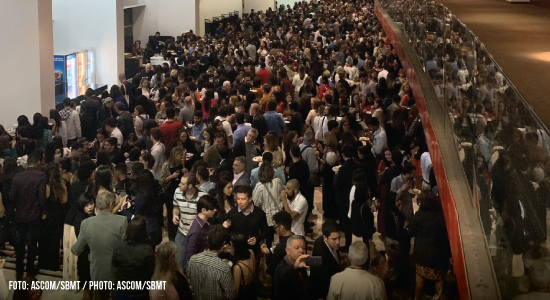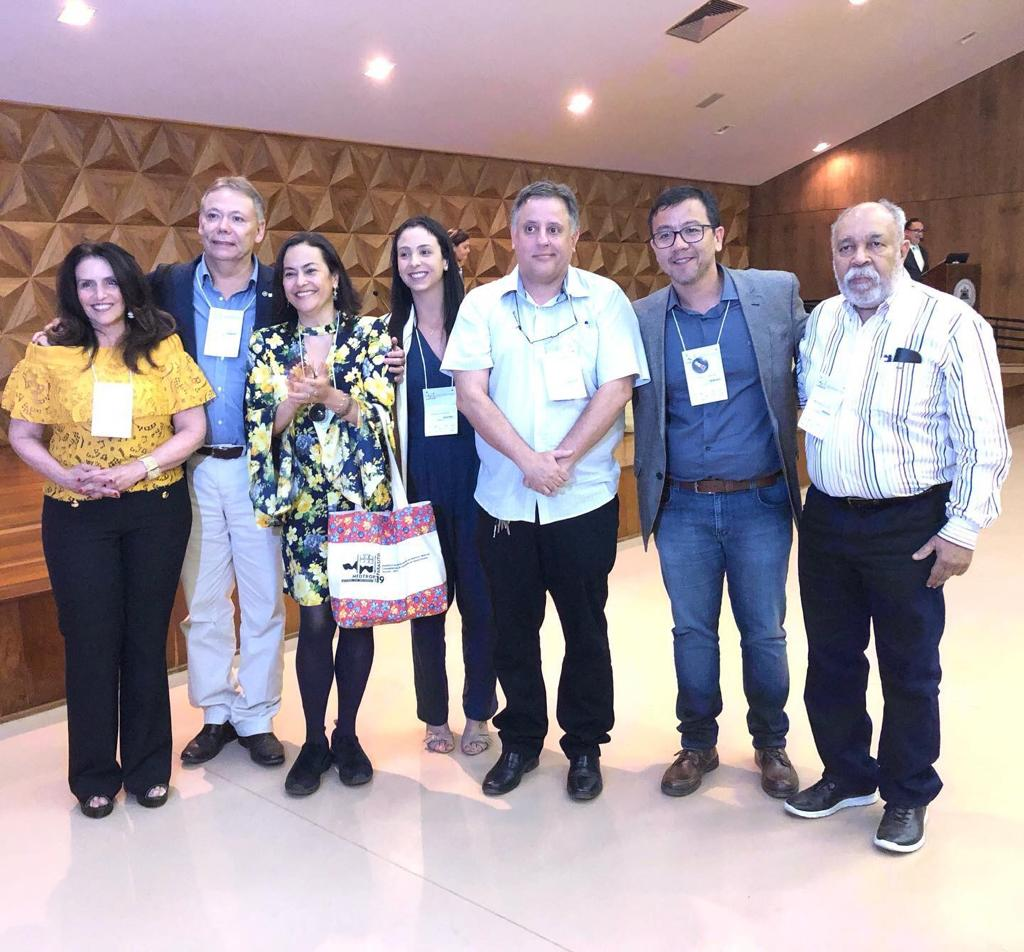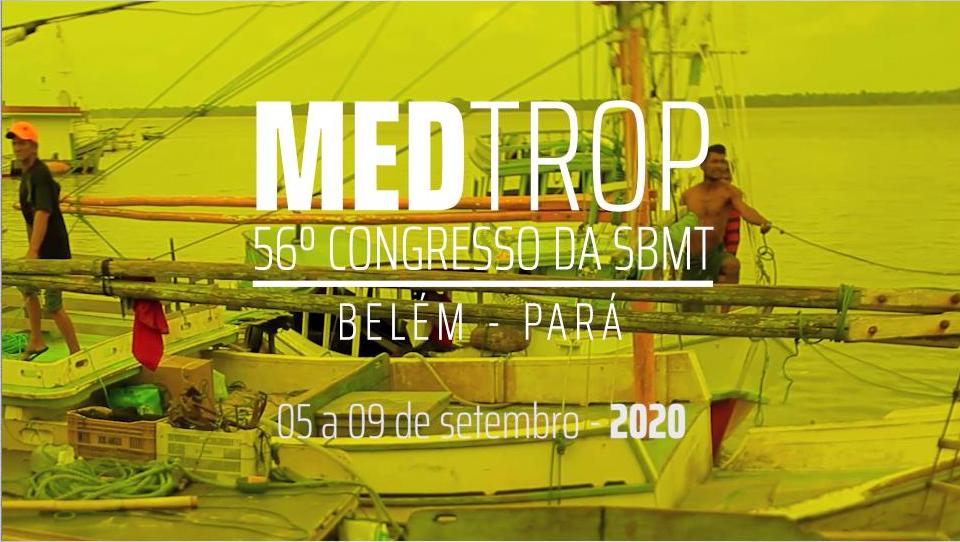
2019 Medtrop-Parasito: Discussion of neglected tropical diseases gathers over 3,000 people
Events debated advances and solutions to diseases affecting about 1 billion people worldwide, especially the vulnerable populations, with scarce financial resources and limited access to health services
09/08/2019
The opening ceremony was marked by the announcement of new resources for research support, such as R$ 24 million for neglected diseases, R$ 10 million for research exclusively dedicated to malaria, and R$ 16 million for tuberculosis studies
For four days, the capital of Minas Gerais hosted the largest medical-scientific event in its history: the 2019 Medtrop-Parasito. The event counted with over 495 national and foreign speakers and debated problems in public health, tropical diseases among neglected populations and emerging and reemerging diseases, permeated with the scientific and social commitment for public policies. At all, there were almost 100 hours dedicated to the discussion of these diseases that affect nearly 1 billion people worldwide, especially the vulnerable populations, with scarce financial resources and limited access to health services. During the event, the speakers discussed the results of ongoing studies for the development of vaccines, drugs, new treatments and new diagnostic tests for diseases such as leishmaniasis, leprosy, dengue, zika, chikungunya, yellow fever, Chagas disease, helminths (ascariasis, taeniasis and schistosomiasis), tuberculosis, syphilis, HIV, and others.
With a significant number, more than 3 thousand participants, including researchers, health professionals and students from Brazilian and international institutions in the areas of Infectology, epidemiology, pharmacy, biomedicine, biology, clinical laboratories, epidemiological surveillance, management and health policies, the 2019 Medtrop-Parasito achieved its goal: inclusion and convergence to strengthen translational research, as well as the relationship between the institutions and the subjects addressed. In total, on 13 different axes, 78 conferences, 65 round tables and 26 mini-conferences were held, a significant number of scientific activities, which opened perspectives for the integration of science, education and technology. In addition, 12 courses were held, 7 workshops, plus the Plos event and the Brazilian Social Forum to Confront Infectious and Neglected Diseases. The Congress also had 17 stands from partner institutions, such as the Oswaldo Cruz Foundation (Fiocruz), the Ministry of Health, the Neglected Diseases Medicines Initiative (DNDi), the Pan American Health Organization (PAHO), among others.
Held between July 28 and 31 at the Campus of the Federal University of Minas Gerais (UFMG), this years edition brought, for the first time, the simultaneous holding of three events: 55th Congress of the Brazilian Society of Tropical Medicine; 26th Brazilian Congress of Parasitology; and 34th Meeting of Applied Research in Chagas Disease and 22nd Meeting of Applied Research in Leishmaniasis, the 2019 CHAGASLEISH. The events were dedicated to sharing advances and solutions to the major tropical diseases that afflict Brazil and the Americas. “Bringing together the scientific community to present their results, new projects, as well as open spaces for discussions that enable new partnerships and new collaborations to respond to the major public health challenges posed by infectious and parasitic diseases, is the role of MedTrop”, says Dr. Sinval Pinto Brandão Filho, President of the Brazilian Society of Tropical Medicine.

The opening ceremony of the largest congress of Tropical Medicine and Parasitology in the country was the scene of the announcement of financial support worth $50 million in research on communicable and neglected diseases made by the Minister of Health, Luiz Henrique Mandetta, being R$ 24 million for studies on neglected diseases; R$ 10 million for research exclusively dedicated to malaria; and R$ 16 million for tuberculosis studies. The resources are intended for researchers of diseases of interest to Brazil, but that were historically neglected, such as malaria, leishmaniasis and Chagas disease. These diseases are still very present, and we have to find solutions for them, said the minister. Still according to him, the intention of the government is to change the path of research held in Brazil. Traditionally, the researcher chooses his/her area of interest and requests resources from the funding institutes; this time, it is the Ministry of Health that is conducting the researches of priority interest. “We want to know if rapid tests for diseases like leishmaniasis, AIDS and syphilis are working. We want to know if the vaccine against malaria, announced some time ago, from the strain that does not exist in Brazil, is useful to find a vaccine for Brazilians. We want practical solutions, we want research aimed at the products that the country needs, about our diseases, our reality”, he added. The notices will be published on the website of the National Council for Scientific and Technological Development (CNPq) later this year. The projects will last 36 months and the support for each research may vary between R$ 500 thousand and R$ 2 million.
Also, during the opening ceremony, the BSTM and the BSP honored the distinguished researchers of their respective societies. Dr. Mitemayer Galvão dos Reis presented the Carlos Chagas Medal of Scientific Merit to Professor Dr. Naftale Katz, one of the most renowned schistosomiasis researchers in Brazil, who has been active in the study of the disease for over 50 years and has published over 270 scientific papers. Among his main contributions, the Kato-Katz parasitological diagnostic method for stool examination should be remembered, as it is used in many countries, the first clinical trials with oxamniquine and praziquantel, epidemiological studies and control of schistosomiasis in endemic areas of Minas Gerais. Dr. Natftale was president of the BSTM and the BSP twice and vice president of the World Federation for Parasitologists. Doctors Edward Felix Silva, Alejandro Luquetti were also honored. Paulo Marcos Zech Coelho and Dr. Hiro Goto, for Applied Research on Chagas Disease and Leishmaniasis. Doctors Luiz Fernando Ferreira and Vicente Amato Neto, deceased in 2018, received in memorian honors.
After the honors, the event was brightened by the awards: Young Researcher Award, divided into three categories (undergraduate, doctorate and master), awarded to students Caue Benito Scarim; Luiza da Lima Silva Standard; Luiz Antonio Perfeto Oliveira Silva; Aristeu Mascarenhas da Fonseca; Larissa Mendes Santos; Roberto de Sena Rodrigues Junior; Pedro Santos Muccillo Reis and Filipe Vieira Santos de Abreu; 2019 Tropical Journalist Award, divided into four categories (Printed media, Online, Radio and TV), awarded to journalists Luiz Henrique da Silva Gomes, Valeria Dias da Silva, Ericka Flavia Marques de Araújo and Ana Graziela Aguiar; NHR Journalism Award, divided into five categories (Newspapers and Magazines, Online, Radio, TV and Stigma special category), awarded to journalists Christian Jhon Gomes Sousa, Wendell Rodrigues, Rita Brito, Jane Fernandes and Ludimila Honorato and Young Investigators Awards, awarded to Dr. Rafael Freitas de Oliveira França by the Institut Merieux.
Still at the opening ceremony, the World Health Organization (WHO) presented an overview of the new 2021-2030 roadmap for the control, elimination or eradication of 20 neglected tropical diseases. Dr. Pedro Albajar Viñas, WHOs technical officer for Tropical Neglected Diseases, reminded participants that the Organization was receiving contributions to the roadmap, which will later be finalized and submitted for approval by countries. The aim is for the document to reflect the views of all stakeholders who contribute to the fight against neglected tropical diseases. “All together trying to propose objectives, goals, indicators that can be monitored, thinking about the social determinants; thinking not only of equality but of equity; thinking about all the opportunities for integration”, said Dr. Albajar. He also recalled the approval of World Day of People with Chagas Disease, which will be celebrated annually on April 14, the day when back in 1909, the first patient, a Brazilian girl named Berenice Soares de Moura, was diagnosed with the disease by Carlos Ribeiro Justinian Chagas. World Day is an important symbol for making the struggle of affected people around the world visible and an incentive for disease control, as well as an opportunity to draw more attention to this and other neglected diseases, as well as the resources needed to control, eliminate or eradicate them.
During the Congress was also presented, for the first time, the results of the thermotherapy and Miltefosine study. The director of cutaneous leishmaniasis program at the Drugs for Neglected Diseases Initiative (DNDi) explained that the studies began three years ago, and the treatment gives more security to patients with higher rates of cure. The results showed that the combination has a cure rate of approximately 80% and is more effective than applying heat and separate meglumine antimoniate injections. In phase 3, the Brazilian centers will work alongside to laboratories in Bolivia, Peru and Panama. This step complements the study that brings together researchers from Peru and Colombia. The project was developed with 130 patients to treat cutaneous leishmaniasis.
The Letter from Belo Horizonte was also presented during the event, prepared during the fourth edition of the Brazilian Social Forum to Confront Infectious and Neglected Diseases, expressing the claims debated and agreed among the participants. By this document, the Forum presents its political-strategic agenda and its democratic commitment to transforming the conditions that prevent the full exercise of the right to health in the country. The Forum was held on July 28 bringing together students, researchers, leaders, social movements and institutions interested in the debate on access to health and inclusive development. Discussion moments were led by partner organizations and people affected by leprosy, Chagas disease, viral hepatitis, schistosomiasis, leishmaniasis and filariasis. Strengthening an integrated agenda and broadening the voices of those suffering from neglected tropical diseases in Brazil were some of the paths reaffirmed in the fourth edition of the Forum. Check the document in full at the link: https://www.nhrbrasil.org.br/atividades/noticias/161-carta-de-belo-horizonte-traz-demandas-do-forum-social.html
With the theme Convergence and Inclusion: Searching for Sustainable Solutions for the Diagnosis, Treatment, and Control of Tropical Diseases, the experience of the 2019 Medtrop-Parasito Joint Congress was a major venue for discussing neglected diseases. From the mountains of Minas Gerais, the 56th Congress of the Brazilian Society of Tropical Medicine (MedTrop) lands in 2020, in the middle of the Amazon, in Belém, Pará, known for its historical and natural beauty, its gastronomy and cultural richness, as well as for being headquarters of the Evandro Chagas Institute (IEC), renowned tropical disease research center, waiting for you between September 5 and 9, 2020. We expect you there!
 …
…










